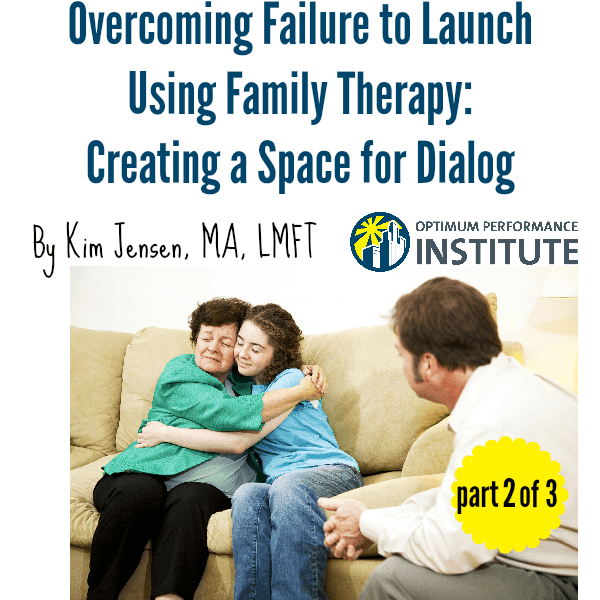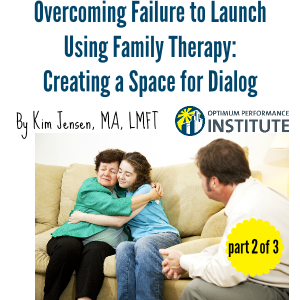
Overcoming Failure to Launch Using Family Therapy: Creating a Space for Dialog (PT 2)
Creating Space for Active Listening
(Haven’t read Part I yet? Click HERE to read it now, then come back to continue on.)
Being able to actively listening means being able to create and hold a space where the individual feels safe and understood. Conversation takes time. To actively hear what someone is saying is allowing them to finish fully their thoughts and reflect back how that impacted you or to utilize inquiry to investigate a statement further. The ability to get at the heart of a matter requires the participants to feel that they are being cared for and that they trust that they will be heard. Trust is at the heart of any effective and healthy relationship and thus needs to be at the center of communication as well.
“My stuff/Your stuff” – Being able to separate out what is “my stuff” vs. what is “your stuff” is akin to separating the wheat from the chaff. “Your stuff” is the emotional reactivity and baggage that one carries through life and that manifests itself in the manner that one communicates. “My stuff” is the biases, baggage and manner in which I emotionally react to stimulate or situations. Understanding that “I can’t change you” brings us closer to acceptance of who that person is. In looking at “my stuff”, we recognize that the way in which we react is patterned by a life time of experiences that we may or may not be able to change or have awareness of. However, “owning it”, is a step forward in being able to create and hold space with another. Reacting to a situation where, for instance, someone says “You gave up so easily” may elicit a hurt response. Owning “my stuff” acknowledges that “giving up so easily” was a family message that your mother may have said to you often as you struggled and practiced a difficult piece on the piano and now serves as a trigger for emotional reactivity. Putting in the work to identify and process those emotional trigger points, helps to be able to effectively hold space in knowing where your counter transference issues lie. Baba Ram Das blogged recently on his website in regards to expectations in relationships:
So somebody comes along and gets to me. They get me angry or uptight or they awaken some desire in me, wow am I delighted. They got me. And that’s my work on myself. If I am angry with you because your behavior doesn’t fill my model of how you should be, that’s my problem for having models. No expectations no upset…
In Ram Das’ case, this incident became an opportunity for personal growth and investigating and processing “his stuff”.
“Validation” – Validation is the ability to communicate to another that what they have said or experienced has been heard and that it has had an impact. To be validated is to have the experience of having another “get you” on a deep or surface level. Validation is to reflect back to the other person that what they are saying or what they are experiencing has been taken in. Reflecting back again statements such as: “That sounds like it was really hard for you”; “You sound really excited about your new boyfriend” or “It is sad when we have to move” helps to demonstrate validity. It is about hearing what has been said and the emotional context and manner in which was being spoken.
“Paraphrasing and using Inquiry for meaning” – Sometimes sessions get so emotionally heated that it is difficult to discern what is actually being said and the meaning behind it. Being able to use inquiry to investigate meaning and paraphrasing back to someone what you think you may have heard, helps to clarify situations. “I’m hearing you say that you need more space to figure things out about college… is that correct” is an accurate use of paraphrase and inquiry. Paraphrasing back to someone allows the speaker to more time to accurately think about what it is that they are saying and also helps to slow down the emotional escalation of conflicts.
More soon! Remember to look out over the next few weeks for the final part 3 of this article, “Moving On.” You may click here to subscribe to our Overcoming Failure to Launch Newsletter to be notified.
For more information on how we support healing broken family community patterns with the young adults in our programs, reach out! At Optimum Performance Institute, we offer compassionate, clinically sophisticated intensive residential help for young dealing with mental health and learning disability issues causing them issues with a failure to launch to the next stage of development (college, work, living independently). Rather than a sterile, hospital-like environment, we offer beautiful accommodations in luxury apartments just outside of Los Angeles. At OPI, we treat the individual, not the diagnosis. We are a diverse community of passionate, highly skilled individuals working together with you to help you find your joy and express it. For more information on OPI residential programs and our measures to help young adults with Bipolar Disorder, call us at (888) 814-5985 or click HERE to submit an online form. We’ll be in touch promptly.

